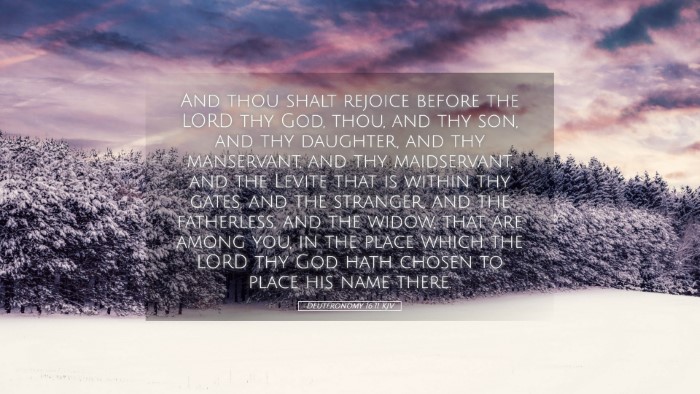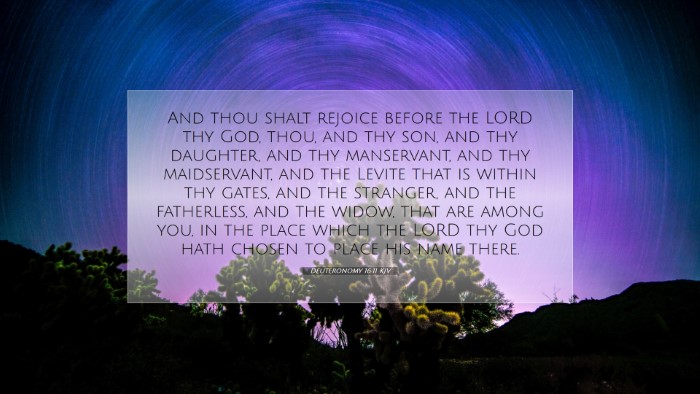Commentary on Deuteronomy 16:11
Verse: "And thou shalt rejoice before the LORD thy God, thou, and thy son, and thy daughter, and thy manservant, and thy maidservant, and the Levite that is within thy gates, and the stranger, and the fatherless, and the widow, that are among you, in the place which the LORD thy God hath chosen to place his name there."
Introduction
Deuteronomy 16:11 occupies a significant position in Moses’ farewell address to the Israelites. This verse captures the essence of communal joy and the inclusivity of worship within Israel's covenant community. It underscores the importance of celebration in the life of God's people while also emphasizing social justice by recognizing marginalized individuals within the community.
Thematic Analysis
- Celebration of Divine Provision: The emphasis on rejoicing reflects the acknowledgment of God’s blessings. The Israelites are commanded to celebrate before the Lord, a theme reiterated throughout Deuteronomy, particularly in connection to the festivals (see Deuteronomy 16:10).
- Community Inclusion: The verse delineates various groups within the society – families, servants, and marginalized individuals. This reflects God’s heart for inclusivity. The command to rejoice together emphasizes that joy is communal and shared among all segments of society.
- Worship at the Chosen Place: The 'place which the LORD thy God hath chosen' signifies the centralization of worship in Israel, ultimately the Temple in Jerusalem. This centralized worship points to the importance of gathering in community to celebrate God’s presence and provision.
Insights from Public Domain Commentaries
Matthew Henry's Commentary
Matthew Henry highlights that this command to rejoice is connected to the offerings made during the feast. He affirms that the joy of the Israelites should not merely be personal but a corporate celebration that includes everyone. He emphasizes the importance of joy in worship, indicating that true religion produces happiness and encourages participation from all, irrespective of their social status. Henry notes that this communal joy should especially include those who might feel excluded or overlooked - the Levite, the stranger, the fatherless, and the widow.
Albert Barnes' Notes on the Bible
Barnes elaborates on the specific groups mentioned in the verse. He clarifies that the Levites were supported by the tithes and offerings of the people, thus underscoring the responsibility of the Israelites to provide for their spiritual leaders. He argues that the inclusion of the stranger, the fatherless, and the widow serves to strengthen social bonds and foster an atmosphere of care and kindness. Barnes concludes that this requirement aims to foster community unity and a spirit of gratitude to God for His continuous provision.
Adam Clarke's Commentary
Clarke notes the cultural implications of joyous celebrations. He reflects on how these events should invigorate the community, instilling a sense of belonging and purpose. He points out the importance of these communal gatherings in reinforcing social responsibility, suggesting that they serve as a reminder of God’s justice and mercy towards those who are typically marginalized. Clarke insists that the act of rejoicing should lead to an outpouring of generosity towards those who are less fortunate, as a reflection of God's kindness.
Applications for Pastors and Theologians
This verse serves as a foundation for understanding both the nature of worship and the call to social inclusivity within the Christian community. Here are some applications:
- Encouraging Communal Worship: Pastors should foster an environment where communal worship reflects joy and includes every member of the congregation. Sermons can emphasize the necessity of recognizing and uplifting those in the community who may feel marginalized.
- Promoting Social Justice: The church should actively involve itself in caring for the needy and advocating for the marginalized as part of the expression of worship. This could involve community outreach programs that cater to the needs of the disenfranchised.
- Building Unity: The text implies a rich tradition of integrating diverse groups into the worship life of the community. Planning services and events that celebrate diversity can help strengthen the bonds among congregants.
Conclusion
Deuteronomy 16:11 is a powerful reminder of God’s call for His people to rejoice and celebrate His goodness in unity and inclusivity. It emphasizes a model of worship that transcends mere ritual and launches into a heartfelt communal celebration that recognizes and uplifts all members of society, especially those often overlooked. Through these insights, pastoral care and theological reflection can foster a church that reflects the love and grace of God, both in worship and in action.


